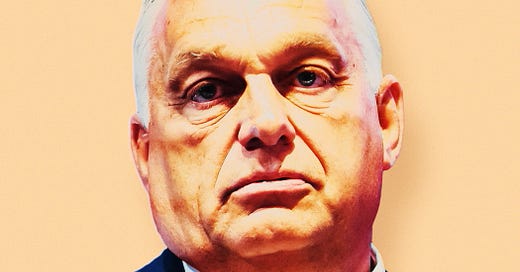
Hungary Accused of Treating U.S. Alliance with “Recklessness”
U.S. ambassador smacks Viktor Orbán’s government for its illiberalism and getting “cozy” with Putin.
THE BIDEN ADMINISTRATION’S PATIENCE with Hungary may have reached its end, at least if one takes the U.S. ambassador in Budapest, David Pressman, seriously. Pressman delivered an absolutely blistering speech last week at the Budapest Forum, a pro-democracy conference held on the former campus of Central European University, the American university founded by George Soros that Prime Minister Viktor Orbán pushed out of the country in 2018.
Describing in considerable detail the many ways in which Viktor Orbán’s government violates democratic values and acts to undermine U.S. interests, Pressman accused the Hungarians of abusing the transatlantic alliance. “Hungary criticizes NATO from within the comfort of the NATO security umbrella,” he said, “and Hungary criticizes the EU under subsidy of the EU’s economic umbrella.” Meanwhile, it exempts Russia and China from criticism completely. This kind of political free riding has its limits, Pressman said: “Continued recklessness with our bilateral relationship will unavoidably change that relationship. . . . We owe it to our ally Hungary—and to our alliance . . . to respond accordingly.”
Since arriving in Hungary in 2022, Pressman has adopted a style unlike anything Orbán has ever experienced from a U.S. ambassador. Unlike the unqualified political appointees both Democratic and Republican administrations have sent to Hungary in recent years, Pressman has thrown himself into the job and worked hard to understand the country. Perhaps because of his background in human rights advocacy, Pressman also has a blunt, in-your-face style. If Teddy Roosevelt’s foreign policy advice was to “speak softly and carry a big stick,” Pressman’s approach is more like “Speak up and swing a baseball bat.” Pressman does not shy away from controversy and frequently injects himself into domestic Hungarian affairs.
For example, last year Pressman, who is Jewish, invited a Hungarian politician named Márton Gyöngyösi to attend a Passover seder held at Pressman’s official residence. Gyöngyösi started his career as a far-right politician indulging in antisemitism. In 2012, he delivered an infamous speech calling upon the government to compile a list of Jewish members of Parliament. Since then, however, Gyöngyösi’s politics have changed. He played a key role in moving his party, Jobbik, to the center right, and served a respectable term as a centrist member of the European Parliament. Gyöngyösi has also been more forceful and articulate than any other Hungarian politician in condemning Russia’s invasion of Ukraine.
At the seder, Gyöngyösi sat in a place of honor on Pressman’s left, directly across from the head of Hungary’s largest Jewish organization, András Heisler. Heisler had not been told he would be celebrating this Jewish high holiday with Gyöngyösi, and, according to reports, wanted to get up and leave immediately except that he feared offending an ambassador of the United States. The public learned of the seder after Pressman posted photos from the evening on social media, featuring both Gyöngyösi and Heisler.
Not surprisingly, the event caused controversy and elicited criticism. Gyöngyösi took advantage of the situation to apologize for his past antisemitic statements. The ambassador’s invitation helped legitimize and further Gyöngyösi’s ongoing efforts at political self-rehabilitation. Yet even if one agrees with Pressman’s assessment of Gyöngyösi (I myself am inclined to), one might reasonably ask whether a U.S. ambassador ought to wade into a country’s domestic political controversies by effectively endorsing the good intentions of the leader of a single political party with a questionable past. What U.S. interest was served by doing so?
Such criticism notwithstanding, Pressman’s energetic style marks a definite improvement over the mediocre ambassadors of recent memory. He has communicated clearly to the Hungarians that the United States has interests in the region which it expects an ally to respect. An assignment in Hungary is no longer a plush appointment for political patrons. The United States is concerned and engaged, which is why its ambassador in Budapest is now a professional diplomat.
PRESSMAN’S CRITICISMS OF THE ORBÁN REGIME have grown increasingly pointed in recent months, but he seemed to cross an important threshold last week. In clear, straightforward language, Pressman put Orbán on notice that, barring dramatic change in his government’s conduct, the United States will stop treating Hungary as an ally.
Failure to follow through on these words would undermine American credibility in the region and reinforce the view that U.S. foreign policy is erratic and in retrenchment. Which in fact makes the timing of Pressman’s speech, six weeks before a consequential U.S. presidential election, somewhat odd. Whether or not Pressman’s warnings amount to anything almost certainly depends on who becomes the next president. Should Trump win in November, Pressman’s tough talk will prove to have been so much hot air.
Viktor Orbán has worked hard to ingratiate himself with Trump, praising him lavishly and visiting Mar-a-Lago twice, once in March and again in July, after a visit with Vladimir Putin. Proof of Orbán’s success is that Trump mentioned the Hungarian leader by name in his debate with Kamala Harris.
And numerous strands connect JD Vance to Hungary. Patrick Deneen, a friend of Vance, supports Orbán and has visited Hungary repeatedly. Rod Dreher, another of Vance’s friends, lives in Hungary and indirectly works for Orbán, as a fellow at a conservative think tank funded by the Hungarian government. Vance’s selection as Trump’s running mate was reportedly backed by Donald Trump Jr. and Tucker Carlson, both of whom are friendly with Orbán. This past July, Don Jr. visited Hungary, where he claimed that “American conservatives see Orbán as a great leader.” Tucker Carlson has been praising Orbán for years.
According to rumors circulating in Budapest, Orbán is contemplating a major reshuffling of Hungary’s foreign ministry. If Trump wins, Balázs Orbán (no relation to the prime minster) could become the new foreign minister. Balázs Orbán has played a central role in cultivating Hungarian relationships with American illiberal intellectuals: As Viktor Orbán’s political director, Balázs Orbán supervises the Mathias Corvinus Collegium, the pseudo-university and think tank where Rod Dreher had an appointment in 2022, as well as the Hungarian Institute of Foreign Affairs, where American right-winger Gladdin Pappin works. Balázs Orbán has also strengthened ties to such right-wing American organizations as the Heritage Foundation and CPAC. And he was recently interviewed by Tucker Carlson, shortly after Carlson’s interview with Putin. His appointment as foreign minister would be a clear sign that Prime Minister Orbán is angling for influence in a Trump White House.
It’s hard to believe that people in Orbán’s government don’t have JD Vance’s cell phone number. If Trump wins in November, Orbán will not only have an ally in the Oval Office, he’ll have several channels of direct and easy access to him, as well as to the vice president who would presumably hope to be president himself someday.
Ambassador Pressman chided Orbán in his speech for choosing to respond to U.S. pressure by banking on a Trump victory in November. “The United States has alliances with countries, not personalities within them. That’s true whether the president of the United States is a Republican or a Democrat,” Pressman said. But Donald Trump doesn’t see things that way. His transactional approach to foreign policy, his position on Ukraine, and his attitude toward democratic backsliding align much closer with Viktor Orbán than Ambassador Pressman.
Although an outgoing Biden administration could certainly inflict pain on Hungary, an incoming Trump administration could reverse most of it. Had Pressman delivered his speech after a Harris victory in November it might have had more effect. Why would the Hungarians act on Pressman’s speech now, knowing the future course of U.S. foreign policy is up in the air? Given the timing, Pressman cannot have intended his speech to change Hungarian behavior. Rather he seems to be banking on an incoming Harris administration to deal with Hungary firmly and follow through on his threats.
For his part, Orbán is banking on an incoming Trump administration to let up on the pressure. As he knows better than almost anyone, this year’s election could prove enormously consequential for U.S.-Hungary relations. So on election night, as you’re watching the news with a mixture of excitement and dread, just know that, in Budapest, Viktor Orbán will be glued to the TV, too, biting his nails and pacing the floor as he awaits the returns from each battleground state.

















